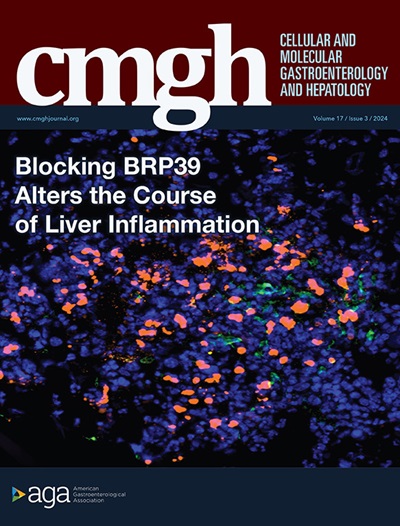In Vivo CRISPR Activation Screening Reveals Chromosome 1q Genes VPS72, GBA1, and MRPL9 Drive Hepatocellular Carcinoma
IF 7.1
1区 医学
Q1 GASTROENTEROLOGY & HEPATOLOGY
Cellular and Molecular Gastroenterology and Hepatology
Pub Date : 2025-01-01
DOI:10.1016/j.jcmgh.2025.101460
引用次数: 0
Abstract
Background & Aims
Hepatocellular carcinoma (HCC) frequently undergoes regional chromosomal amplification, resulting in elevated gene expression levels. We aimed to elucidate the role of these poorly understood genetic changes by using CRISPR activation (CRISPRa) screening in mouse livers to identify which genes within these amplified loci are cancer driver genes.
Methods
We used data from The Cancer Genome Atlas to identify that frequently copy number-amplified and up-regulated genes all reside on human chromosomes 1q and 8q. We generated CRISPRa screening transposons that contain oncogenic Myc to drive tumor formation. We conducted CRISPRa screens in vivo in the liver to identify tumor driver genes. We extensively validated the findings in separate mice and performed RNA sequencing analysis to explore mechanisms driving tumorigenesis.
Results
We targeted genes that frequently undergo amplification in human HCC using an in vivo CRISPRa screening system in mice, which induced extensive liver tumorigenesis. Human chromosome 1q genes Zbtb7b, Vps72, Gba1, and Mrpl9 emerged as drivers of liver tumorigenesis. In human HCC there is a trend in correlation between levels of MRPL9, VPS72, or GBA1 and poor survival. In validation assays, activation of Vps72, Gba1, or Mrpl9 resulted in extensive liver tumorigenesis and decreased survival in mice. RNA sequencing revealed different mechanisms driving HCC, with Mrpl9 activation altering genes functionally related to mitochondrial function, Vps72 levels altering phospholipid metabolism, and Gba1 activation enhancing endosomal-lysosomal activity, all leading to promotion of cellular proliferation. Analysis of human tumor tissues with high levels of MRPL9, VPS72, or GBA1 revealed congruent results, indicating conserved mechanisms driving HCC.
Conclusions
This study reveals chromosome 1q genes Vps72, Gba1, and Mrpl9 as drivers of HCC. Future efforts to prevent or treat HCC can focus on these new driver genes.
求助全文
约1分钟内获得全文
求助全文
来源期刊

Cellular and Molecular Gastroenterology and Hepatology
Medicine-Gastroenterology
CiteScore
13.00
自引率
2.80%
发文量
246
审稿时长
42 days
期刊介绍:
"Cell and Molecular Gastroenterology and Hepatology (CMGH)" is a journal dedicated to advancing the understanding of digestive biology through impactful research that spans the spectrum of normal gastrointestinal, hepatic, and pancreatic functions, as well as their pathologies. The journal's mission is to publish high-quality, hypothesis-driven studies that offer mechanistic novelty and are methodologically robust, covering a wide range of themes in gastroenterology, hepatology, and pancreatology.
CMGH reports on the latest scientific advances in cell biology, immunology, physiology, microbiology, genetics, and neurobiology related to gastrointestinal, hepatobiliary, and pancreatic health and disease. The research published in CMGH is designed to address significant questions in the field, utilizing a variety of experimental approaches, including in vitro models, patient-derived tissues or cells, and animal models. This multifaceted approach enables the journal to contribute to both fundamental discoveries and their translation into clinical applications, ultimately aiming to improve patient care and treatment outcomes in digestive health.
 求助内容:
求助内容: 应助结果提醒方式:
应助结果提醒方式:


